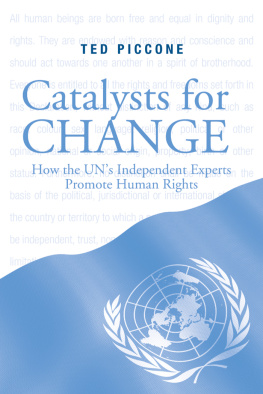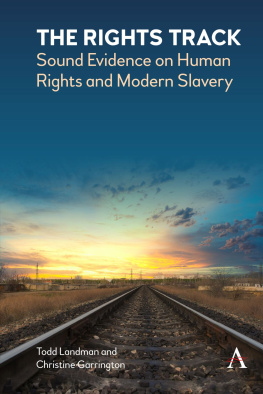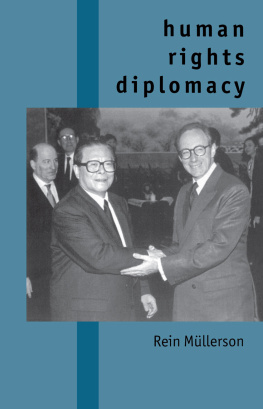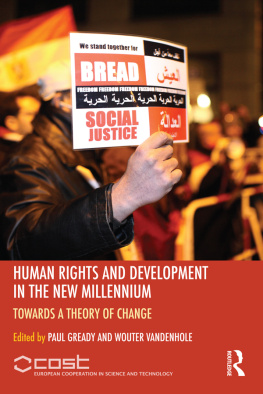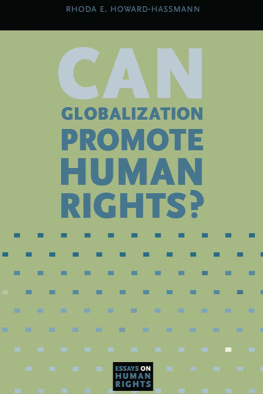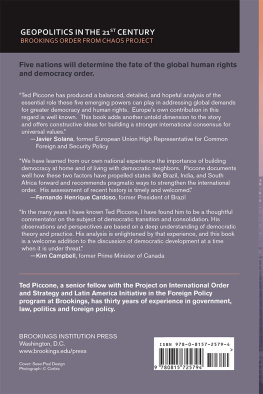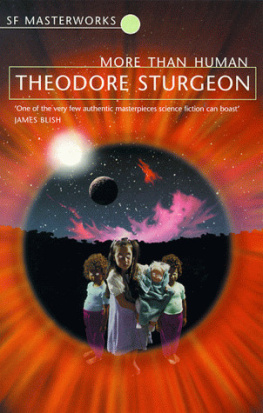Copyright 2012
THE BROOKINGS INSTITUTION
1775 Massachusetts Avenue, N.W., Washington, DC 20036
www.brookings.edu
All rights reserved. No part of this publication may be reproduced or
transmitted in any form or by any means without permission in writing
from the Brookings Institution Press.
Library of Congress Cataloging-in-Publication data is available.
ISBN: 978-0-8157-2192-5 (pbk. : alk. paper)
9 8 7 6 5 4 3 2 1
Printed on acid-free paper
Typeset in Minion and Optima
Composition by Cynthia Stock
Silver Spring, Maryland
Printed by R. R. Donnelley
Harrisonburg, Virginia
T he intersection of law, politics, and diplomacy has intrigued me since my undergraduate days, when I first studied the principles of Wilsonianism and their influence on Franklin D. Roosevelt's policies toward Latin America. Later, I was fortunate to spend eight years as a senior adviser in government during the transition from cold war-era policies to a more balanced and supportive approach toward our democratizing neighbors to the south. Subsequently, I had the opportunity to organize international campaigns for human rights and democratic change from a civil society perspective. More recently, these experiences inspired me to dig deeper into the global dynamics around democracy and human rights from the vantage point of policy research here at Brookings. Thus I returned to the age-old question of how international norms run up against traditions of national sovereignty.
One of the lingering questions in that domain that, in my view, deserved more time and analysis was how the United Nations human rights system works and how it can be improved. If we could identify, in some empirically valid way, the key factors that shape respect for human rights at the national level, we might be able to derive a host of important recommendations for strengthening the international community's role in the process. I was particularly interested in the work of the UN's independent experts on human rights (known in UN parlance as the special procedures), who had drawn so much praise and a fair amount of criticism for their activities. Their work had attracted more attention than usual in 2005-06 in the context of the negotiations to abolish the Commission on Human Rights and to create a new and more elevated Human Rights Council. Exasperation and outright hostility toward both the commission and the council from the Bush administration, Capitol Hill, and other governments only heightened my interest in examining in more depth the tricky intersection between universal norms and practical implementation of such norms at the country level.
I was drawn to this issue for several reasons. First, I knew from my own experience and further research that sound, empirical studies of the role of the special procedures and the effectiveness of this mechanism on the ground had never been published. Second, I was convinced that the main challenge to the international human rights community is, as UN High Commissioner for Human Rights Louise Arbour declared, implementation, implementation, implementation. While new human rights norms may need to be developed in some areas, the main human rights principles, protocols, and procedures have already been conceptualized and codified in customary international law and in treaties that have been signed and ratified by most governments. The real challenge now is to figure out how the international system created since the end of World War II can be more effective in influencing states to promote and protect human rights for all. Third, given the intensity of the debate around creation of the council, and knowing that its work would be reviewed after five years (in 2011), I felt there was an opportunity to contribute something meaningful to the discussion.
Thus began a nearly four-year odyssey to conceptualize and design a valid method for evaluating the effectiveness of the forty-year-old mechanism of independent UN experts on human rights and to compile the results in a digestible way. As explained in , we first had to get our arms around the vast quantity of reporting by special procedures that already exists in the UN system. We also sought to zero in on two critical tools that the independent experts use to carry out their mandates: country visits and written communications to states. After hundreds of hours of laborious examination of the quantity and quality of this voluminous reporting, we were able to derive some solid conclusions on the most important factors that shape the effectiveness of the mechanism. To validate and elaborate on these findings, I carried out five field trips and multiple visits to Geneva to talk firsthand with a wide range of more than 250 stakeholders, from frontline human rights defenders to top-level diplomats; I also interviewed dozens of special rapporteurs themselves to get the qualitative input indispensable to telling the whole story. In the end, I believe the book captures the essential truths about how this unheralded system of independent experts serves as a catalyst for human rights and, in so doing, about the wider phenomenon of the universalization of basic human rights principles.
The book is organized to help guide the reader efficiently through this collection of original material in a concise yet comprehensive fashion. After introducing the political and historical context of the subject, looks at the future of special procedures by offering a series of recommendations for strengthening the mechanism, particularly steps to address its dearth of follow-up mechanisms and insufficient resources.
I am grateful to so many people who helped make this project a reality. Brookings president Strobe Talbott has been a steady and stalwart supporter of the idea of doing more public policy research on questions of human rights, humanitarian affairs, and foreign policy. He, along with Martin Indyk, vice president and director of foreign policy at Brookings, and his predecessor Carlos Pascual, now special envoy and coordinator for International Energy Affairs at the U.S. Department of State, played an essential leadership role in backing this effort. Michael O'Hanlon, senior fellow and director of research in the foreign policy program at Brookings, gave a thoughtful critique of the draft and, with Mary Fox, coordinated the external review of the manuscript, including evaluations by two anonymous reviewers for whose wise advice I am especially grateful. Ongoing support from current and former members of the Brookings foreign policy team, especially Charlotte Baldwin, Julia Cates, Adrienne Anzanello, Margaret Humenay, Gail Chalef, Kristina Server, and Jacqueline Geis, was essential for keeping the project on track. The staff of Brookings Institution Press, led by Bob Faherty and including Janet Walker, Chris Kelaher, Melissa McConnell, and editor Katherine Kimball, played a critical role in producing and finalizing the edits for the book.
I was very fortunate in carrying out the project to have the guidance and advice of an outstanding experts advisory group of practitioners, academics, lawyers, and activists (listed in .
To do an objective evaluation of how governments respond to the special procedures, we had to analyze the public written record, which is voluminous. In making sense of it, I had the invaluable assistance of my stellar senior research assistant, Emily Alinikoff. On this and so many other details from a to z, Emily made things happen, brought new ideas, created innovative ways of analyzing and organizing data, organized multiple trips and interviews around the world, and trained and coordinated a fantastic group of top-notch graduate and undergraduate students. I am especially grateful to Nicholas Marwell, who helped me conceptualize the project, and Christopher Le Mon, who did excellent work on methodology. In addition, I want to thank Pooja Kadakia, Matthew Perault, Patrick Griffith, Shubra Ohri, Anna Fox, Sayo Saruta, Mila Cecerina, Bora Park, Anna Sims, and Shannon Dobson for doing the yeoman's work of analyzing literally thousands of reports and communications.

